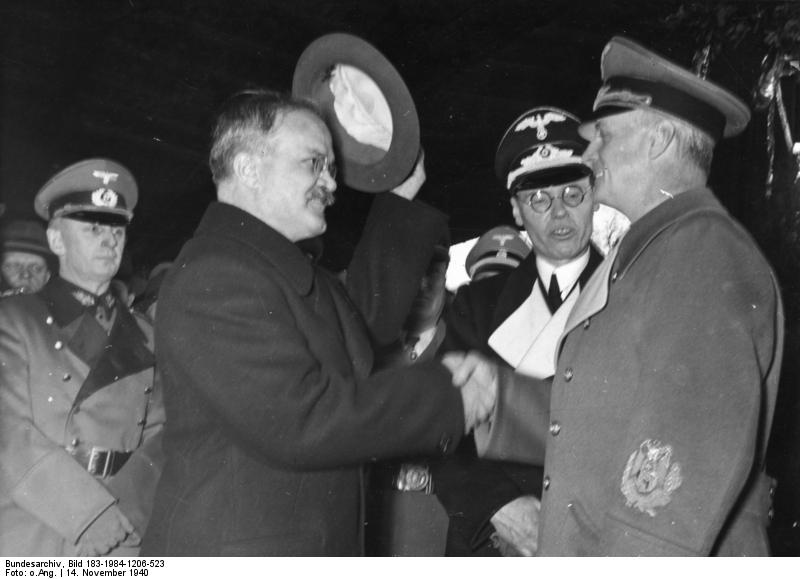
| Historical Information | ||||||||
| Caption | Vyacheslav Molotov and Joachim von Ribbentrop shaking hands, Anhalter Station, Berlin, Germany, 14 Nov 1940 ww2dbase | |||||||
| WW2-Era Location Name | Berlin, Germany | |||||||
| Date | 14 Nov 1940 | |||||||
| Photographer | Unknown | |||||||
| Source Information | ||||||||
| Source | ww2dbaseGerman Federal Archives | |||||||
| Identification Code | Bild 183-1984-1206-523 | |||||||
| Related Content | ||||||||
| More on... |
| |||||||
| Photos on Same Day | 14 Nov 1940 | |||||||
| Licensing Information | ||||||||
| Licensing | Creative Commons Attribution ShareAlike 3.0 Germany License (CC BY-SA 3.0 DE).
See Bild 183-1984-1206-523 on Wikimedia Commons According to the German Federal Archive (Bundesarchiv), as of 21 Jul 2010, photographs can be reproduced with if these preconditions are met: - add the signature of the pictures and - of name of the originator, i.e. the photographer. ... You also can use fotos from the Federal Archives for free on Wikimedia Commons https://commons.wikimedia.org/wiki/Commons:Bundesarchiv Please contact us regarding any inaccuracies with the above information. Thank you. |
|||||||
| Metadata | ||||||||
| Added By | C. Peter Chen | |||||||
| Photo Size | 800 x 579 pixels | |||||||
Please consider supporting us on Patreon. Even $1 per month will go a long way! Thank you. Please help us spread the word: Stay updated with WW2DB: |
Visitor Submitted Comments
All visitor submitted comments are opinions of those making the submissions and do not reflect views of WW2DB.
Search WW2DB

Map
WW2-Era Location Name:Berlin, Germany
Latitude-Longitude:
52.5031, 13.3819
Current Site Statistics
- » 1,181 biographies
- » 337 events
- » 45,132 timeline entries
- » 1,249 ships
- » 350 aircraft models
- » 207 vehicle models
- » 376 weapon models
- » 123 historical documents
- » 261 facilities
- » 470 book reviews
- » 28,427 photos
- » 365 maps
Famous WW2 Quote
"All right, they're on our left, they're on our right, they're in front of us, they're behind us... they can't get away this time."Lt. Gen. Lewis B. "Chesty" Puller, at Guadalcanal
Support Us
Please consider supporting us on Patreon. Even $1 a month will go a long way. Thank you!
Or, please support us by purchasing some WW2DB merchandise at TeeSpring, Thank you!
7 Sep 2015 05:17:14 PM
Between Molotov and Ribbentrop is Gustav Hilger, Ribbentrop’s chief advisor on Soviet affairs. Hilger was born in Moscow to German parents and between the wars he worked for over ten years at the German Embassy in Moscow. After returning to Germany, Hilger worked in the Foreign Office under Ribbentrop. Because he was fluent in German and Russian, he served as an interpreter on many occasions, including during the negotiations leading up to the Molotov-Ribbentrop Pact of 1939 (and a service he is undoubtedly performing in this photo). Because of Hilger’s long practical experience in working closely with the Soviets, he became a valuable asset to the Americans after the war and spent the later part of his life as a consultant for the Central Intelligence Agency. Like the scientists of Operation Paperclip, Hilger’s case well illustrates the post-war principle that security needs outweighed moral considerations.